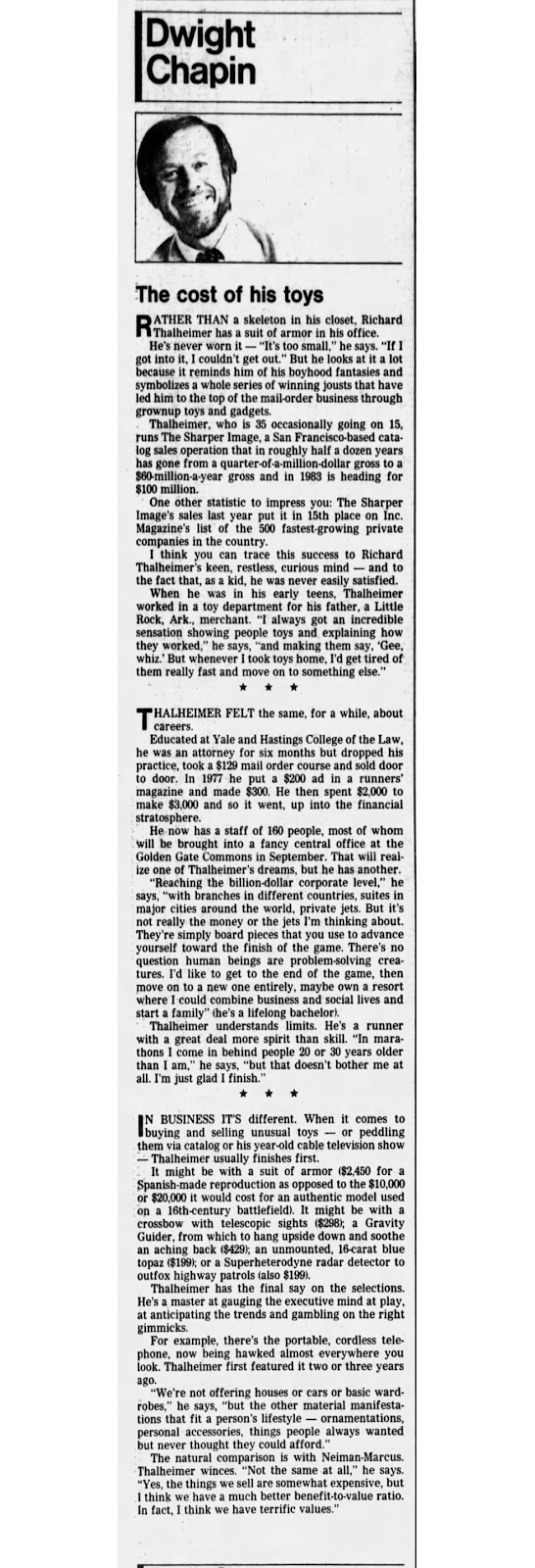Richard Thalheimer has a suit of armor in his office. He’s never worn it – “It’s too small,” he says. “If I got into it, I couldn’t get out.” But he looks at it a lot because it reminds him of his boyhood fantasies and symbolizes a whole series of winning jousts that have led him to the top of the mail-order business through grownup toys and gadgets.
Thalheimer, who is 35 occasionally going on 15, runs The Sharper Image, a San Francisco-based catalog sales operation that in roughly half a dozen years has gone from a quarter-of-a-million-dollar gross to a $60-million-a-year gross and in 1983 is heading for $100 million.
One other statistic to impress you: The Sharper Image’s sales last year put it in 15th place on Inc. Magazine’s list of the 500 fastest-growing private companies in the country.
I think you can trace this success to Richard Thalheimer’s keen, restless, curious mind – and to the fact that, as a kid, he was never easily satisfied.
When he was in his early teens, Thalheimer worked in a toy department for his father, a Little Rock, Ark., merchant. “I always got an incredible sensation showing people toys and explaining how they worked,” he says, “and making them say, ‘Gee, whiz.’ But whenever I took toys home, I’d get tired of them really fast and move on to something else.”
Thalheimer felt the same, for a while, about careers.
Educated at Yale and Hastings College of the Law, he was an attorney for six months but dropped his practice, took a $129 mail-order course and sold door to door. In 1977 he put a $200 ad in a runners’ magazine and made $300. He then spent $2,000 to make $3,000 and so it went, up into the financial stratosphere.
He now has a staff of 160 people, most of whom will be brought into a fancy central office at the Golden Gate Commons in September. That will realize one of Thalheimer’s dreams, but he has another.
“Reaching the billion-dollar corporate level,” he says, “with branches in different countries, suites in major cities around the world, private jets. But it’s not really the money or the jets I’m thinking about. They simply board pieces that you use to advance yourself toward the finish of the game. There’s no question that human beings are problem-solving creatures. I’d like to get to the end of the game, then move on to a new one entirely, maybe own a resort where I could combine business and social lives and start a family” (he’s a lifelong bachelor).
Thalheimer understands limits. He’s a runner with a great deal more spirit than skill. “In marathons, I come in behind people 20 or 30 years older than I am,” he says, “but that doesn’t bother me at all. I’m just glad I finish.”
In business it’s different. When it comes to buying and selling unusual toys – or peddling them via catalog or his year-old cable television show – Thalheimer usually finishes first.
It might be with a suit of armor ($2,450 for a Spanish-made reproduction as opposed to the $10,000 or $20,000 it would cost for an authentic model used on a 16th-century battlefield). It might be with a crossbow with telescopic sights ($298); a Gravity Guider, from which to hang upside down and soothe an aching back ($429); an unmounted, 16-carat blue topaz ($199); or a Superheterodyne radar detector to outfox highway patrols (also $199).
Thalheimer has the final say on the selections. He’s a master at gauging the executive mind at play, at anticipating trends and gambling on the right gimmicks.
For example, there’s the portable, cordless telephone, now being hawked almost everywhere you look. Thalheimer first featured it two or three years ago.
“We’re not offering houses or cars or basic wardrobes,” he says, “but the other material manifestations that fit a person’s lifestyle – ornamentations, personal accessories, things people always wanted but never thought they could afford.”
The natural comparison is with Neiman-Marcus. Thalheimer winces. “Not the same at all,” he says. “Yes, the things we sell are somewhat expensive, but I think we have a much better benefit-to-value ratio. In fact, I think we have terrific values.”




